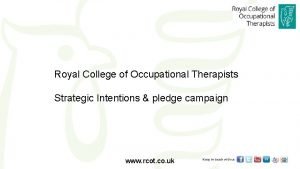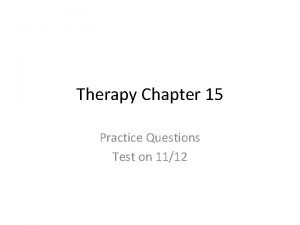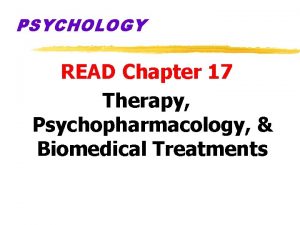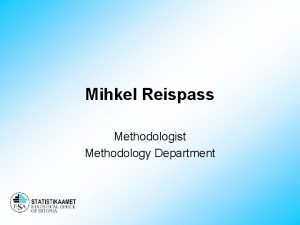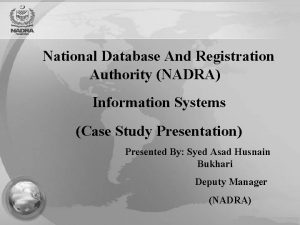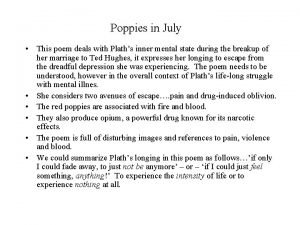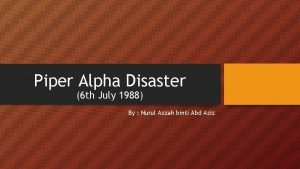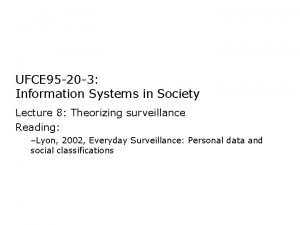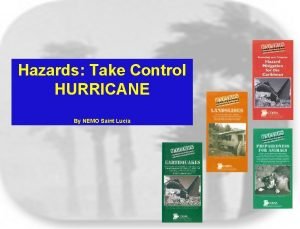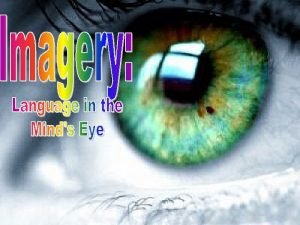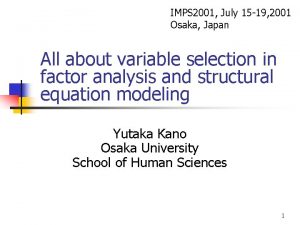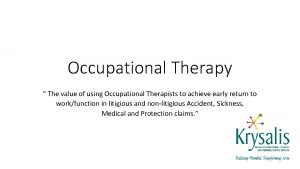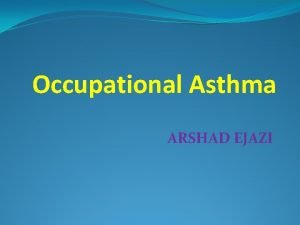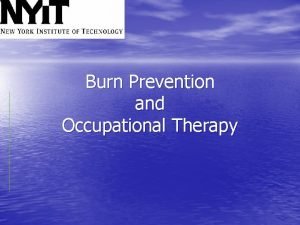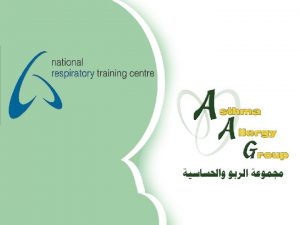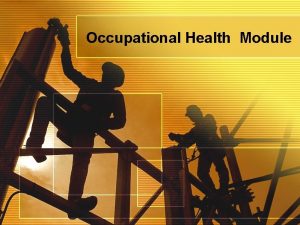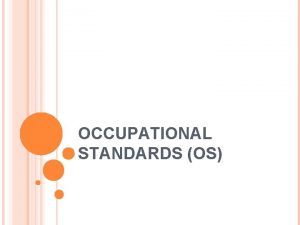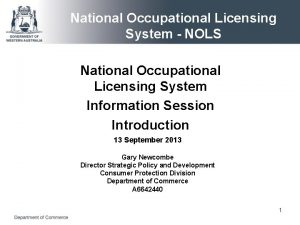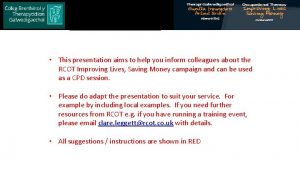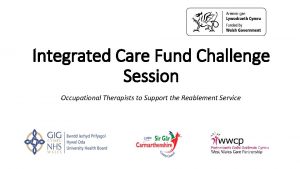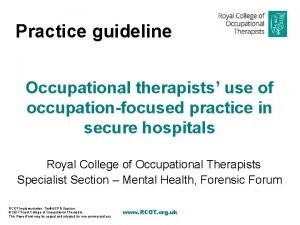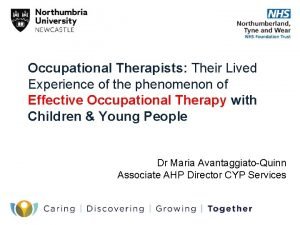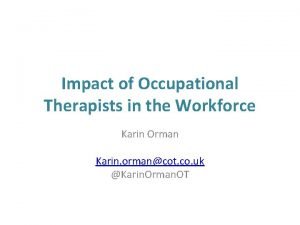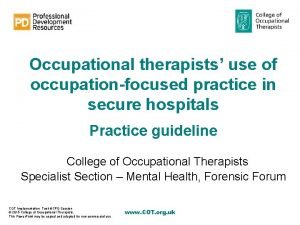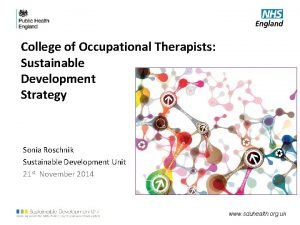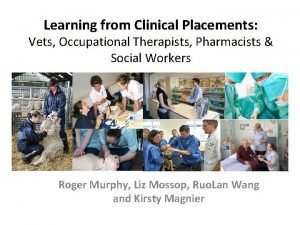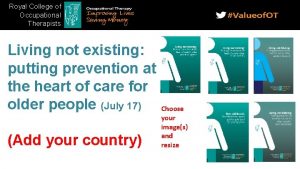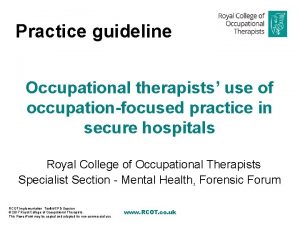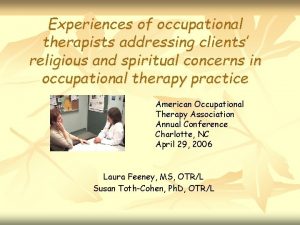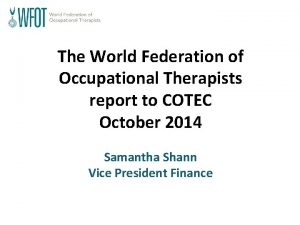National Registration for Occupational Therapists from 1 July





















- Slides: 21

National Registration for Occupational Therapists: from 1 July 2012

Background • March 2008 - COAG agreed to establish a national scheme • National Law adopted 2009 onwards • The National Registration and Accreditation Scheme (NRAS) commenced nationally on 1 July 2010 • 10 health professions are regulated • OT and 3 other professions will join NRAS from 1 July 2012 • The National Scheme strengthens protection of the public and streamlines registration across jurisdictions. 2

Who does what? National Board • Protection of the public by regulating practice of occupational therapy • Operations and powers governed by National Law AHPRA • Maintains the register • Investigates notifications and complaints • Supports work of the Boards • Operations and powers governed by the National Law 3

Key functions of the Board • • Register suitably qualified and competent persons Decide the requirements for registration via standards Develop standards, codes and guidelines Approve accredited programs of study Oversee the assessment of the knowledge and clinical skills of overseas trained applicants for registration Oversee the receipt, assessment and investigation of notifications (complaints) on health, performance and conduct – except for events in NSW Establish panels to conduct hearings of health and performance matters Maintain registers (with AHPRA) 4

The Occupational Therapy Board of Australia 5

Occupational therapists MUST be registered ON 1 July 2012 Practitioners who are currently registered with a state or territory registration board will automatically transition into the National Scheme. 1. Make sure your contact details are up to date with your current S/T Board 2. Make sure you are aware of the registration standards, codes and guidelines for occupational therapists in the National Scheme (eg CPD, PII) 3. No need to apply for registration 4. No application fee 5. When your renewal falls due, renew in the National Scheme 6. Annual renewal 30 November each year 6

Occupational therapists MUST be registered ON 1 July 2012 (cont’d) Practitioners who are not currently registered will need to apply to register: 1. Registration forms will be available from late February 2012. Submit your application form by 30 March 2012 to allow for processing time by 1 July 2012 2. Pay a one-off application fee and a pro rata registration fee of 5 months (for the period of 1 July 2012 to 30 November 2012) 3. Then, an annual renewal, 30 November, every year 7

Fees Guiding principles: Registration fees to be reasonable and must be sufficient to support registration activities within the Scheme. • Application for registration (one off) $280 o The application fee covers the additional administrative costs associated with processing a new application o Pro-rata registration fee of 5 months (for the period 1 July 2012 to 30 November 2012) $117 • Practitioner registration renewal – every year at a 12 month period $280 o The registration renewal fee is an annual fee. Every practitioner must pay it, every year o Fees are tax deductible o Fees are GST free 8

You must register …. . • To use the title ‘occupational therapist’ • Claim to be qualified to practise as an occupational therapist. • You may also need to register if you work in a role not titled occupational therapist. Additional guidance will be provided on the Board’s website. • It is important to note that practising as an occupational therapist is not limited to providing direct clinical services to clients. 9

The definition of practice is broad: “Any role, whether remunerated or not, in which the individual uses their skills and knowledge as a health practitioner in their profession. Practice is not restricted to the provision of direct clinical care. It also includes using professional knowledge in a direct non-clinical relationship with clients, working in management, administration, education, research, advisory, regulatory or policy development roles, and any other roles that impact on safe, effective delivery of services in the profession. ” 10

Further Information www. occupationaltherapyboard. gov. au www. ahpra. gov. au 11

Standards, codes and guidelines Five mandatory registration standards: • Continuing professional development (Standard and Guideline) • Criminal history • English language skills • Professional indemnity insurance • Recency of practice Additional Standards, Codes and Guidelines: • Grand-parenting registration standard to provide transitional arrangements for qualifications • Further codes and guidelines determined, as needed (eg Code of Conduct, Advertising, Mandatory Notifications) 12

Continuing Professional Development Registration Std • Declaration of compliance with CPD made at renewal • Requires minimum 30 hours of CPD annually to maintain and improve competence in area of practice • Until 30 Nov 2013 to complete first 30 hours (17 months) • Formal learning (max 25), informal learning (max 25), engagement with the profession (max 10) • Can apply for partial exemption in special circumstances • Periodic audits • Does not apply to students or to a person granted ‘non-practising’ registration 13

Continuing Professional Development Guidelines • CPD Guidelines to accompany the CPD Registration Standard • The Guidelines provide further information on: – activities that qualify as CPD – examples of partial exemption, for special circumstances – record keeping – keeping a CPD portfolio – cost-neutral examples of CPD activities, including options for rural and remote area practitioners – a CPD template example (available from website) 14

Professional Indemnity Insurance Registration Std • National Law requires that a registered health practitioner must not practise their profession unless they have appropriate PII arrangements in place • Onus on practitioner to ensure cover is adequate and complies with the standard • Declaration at application and renewal • PII does not apply to a person granted ‘non-practising’ registration 15

Recency of Practice Registration Std • At least 6 months FTE in any 5 year period • Declaration at initial application and renewal • The nature, extent, period and recency of any previous practice in the profession must be sufficient to meet the requirements approved by the Board • An exemption has been included for practitioners to apply for provisional registration to undertake a period of supervised practice • Does not apply to students or to a person granted ‘non-practising’ registration 16

Criminal History Registration Std (Common Standard across all professions) The Board takes into account: • Nature/gravity of offence/alleged offence • Period elapsed since offence • Whether finding of guilt • Any sentence imposed • Age of practitioner and any victim • Whether since decriminalised • Behaviour since offence/allegation • Likelihood of future threat to patients • Additional relevant information • Periodic audits 17

English Language Registration Std English language skills for safe and competent practice. • • • Applies to applicants for initial registration (not students) who are: – Internationally qualified or – Who qualify for registration, but did not complete their secondary education in English Submit test results via IELTS 7 or OET grades A or B in each of the four components (listening, reading, writing, speaking) Test results in one sitting, obtained within two years prior to applying to register (note: older results acceptable, if proof of being actively employed as an OT, in one of the countries listed in the Std) 18

English Language Registration Std Exemptions may apply: • Where secondary education was undertaken and completed in one of these countries (i. e. Australia, Canada, New Zealand, Republic of Ireland, South Africa, UK, USA) • Limited registration under special circumstances (conditions may apply eg supervision, an interpreter) Standard is consistent with the English language requirement used by: • Occupational Therapy Council (Aust & NZ) • NOOSR education profiles • Other National Boards 19

Grandparenting Registration Std • Special provisions under s 303 of the National Law for transitional arrangements for qualifications • Eligible to apply for general registration if: a) Holds an approved qualification or completed adequate training (as listed) b) Holds a qualification (not listed) but undertaken any further study, training or supervised practice (Phase 1 and 2 assessments via OTC with CPC) c) Not meet either of the above, but has practiced the profession at any time between 1 July 2002 – 30 June 2012 for a consecutive period of five years, or any periods together which amount to five years 20

Questions? Further support: OTBA website: www. occupationaltherapyboard. gov. au AHPRA: 1300 419 495 AHPRA: Enquiry Form www. ahpra. gov. au 21
 Royal college of occupational therapists
Royal college of occupational therapists Which of the following therapists would most likely
Which of the following therapists would most likely Client centered therapists try to appreciate
Client centered therapists try to appreciate National occupational classification
National occupational classification National database and registration authority
National database and registration authority July 30 2009 nasa
July 30 2009 nasa Why are leaf yeasts more plentiful in july
Why are leaf yeasts more plentiful in july July 4 sermon
July 4 sermon The harp by harris burdick
The harp by harris burdick Imagery in poppies in july
Imagery in poppies in july July 12 1776
July 12 1776 Criciúma ec
Criciúma ec January. february
January. february Slidetodoc.com
Slidetodoc.com July 26 1953
July 26 1953 Sources nso july frenchhowell neill technology...
Sources nso july frenchhowell neill technology... Harris burdick pictures
Harris burdick pictures June too soon july stand by
June too soon july stand by July 10 1856
July 10 1856 The hot july sun beat relentlessly down
The hot july sun beat relentlessly down 2001 july 15
2001 july 15 July 14 1789
July 14 1789
